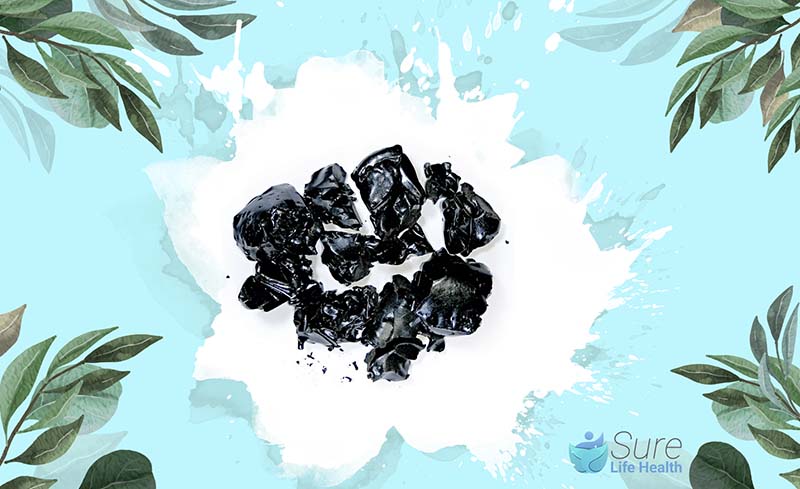Shilajit, a natural substance celebrated in Ayurvedic medicine and known as “the destroyer of weakness” originates from plant matter in the Himalayas.
Laden with minerals, vitamins, and antioxidants, it is particularly esteemed for its benefits in sexual health, notably for erectile dysfunction (ED).
In this article, we will explore the Shilajit dosage for erectile dysfunction, how to use it, and the potential benefits it may offer.
How Does Shilajit Help in Erectile Dysfunction (ED)?
Shilajit, a renowned herb in Ayurvedic medicine, holds significant promise for addressing erectile dysfunction (ED). In a study involving 60 infertile men administered Shilajit twice daily over 90 days, nearly half reported notable improvements in sperm count and motility. These factors are crucial in male fertility and overall sexual health.
Rich in fulvic acid and minerals, Shilajit enhances spermatogenesis, boosts testosterone levels, and improves sperm quality and mobility. This potent Himalayan mineral compound not only promotes healthier blood circulation around the male genital area, aiding in resolving many ED-related issues, but it also elevates energy levels by increasing lipid metabolism.
Furthermore, Shilajit’s benefits extend beyond sexual health. It’s acclaimed for bolstering the immune system and managing stress, both of which play a significant role in overall wellness. Its potential to improve blood flow, augment testosterone production, and alleviate stress and anxiety underscores its effectiveness in combating ED.

7 Other Benefits of Shilajit for Male Health
Enhance Male Hormones
Shilajit is believed to naturally elevate testosterone levels, a vital hormone crucial for muscle mass, fat distribution, bone density, and libido.
Research indicates that Shilajit supplementation can boost testosterone levels in healthy males, contributing to overall physical and mental well-being.

Enhance Cardiovascular Health
With its antioxidant properties and rich mineral content, Shilajit may support heart health. It has the potential to regulate blood pressure by reducing stress and promoting vasodilation.
Studies suggest that regular intake of Shilajit can lower cholesterol and triglyceride levels, reducing the risk of heart disease.

Increase Concentration
Some research suggests that Shilajit may decrease the risk of dementia and enhance cognitive function and concentration.
Its high fulvic acid content is known to improve memory, with ongoing studies exploring its potential in slowing dementia progression in individuals with Alzheimer’s disease.
Anti-aging Support
Studies indicate that Shilajit possesses potent anti-inflammatory and antioxidant effects. In Ayurvedic tradition, it’s believed to promote longevity and combat aging.
Shilajit may mitigate oxidative stress, stimulate cell renewal, and potentially increase collagen production, benefiting overall health and reducing the risk of certain conditions.
Increase Liver Health and Prevent Cancer
Thanks to its antioxidant and anti-inflammatory properties, Shilajit may support liver health and offer protection against cancer. Some studies suggest its potential in fighting viruses and enhancing immune function.
Preliminary evidence hints at Shilajit’s ability to combat liver cancer by preventing cell damage associated with cancer development.
Avoid Chronic Fatigue
Shilajit may offer relief for Chronic Fatigue Syndrome (CFS) by increasing ATP production, thereby boosting cellular energy.
Studies suggest that it enhances mitochondrial function, crucial for maintaining cellular health and energy levels. Improved mitochondrial function may help alleviate CFS symptoms and improve daily functioning.
Treatment of Iron Deficiency Anemia of the Body
Apart from fulvic acid, Shilajit contains various minerals, including iron, gold, silver, and copper. Its iron content may aid in treating symptoms of iron deficiency anemia.
Although research on Shilajit’s benefits for anemia is limited, animal studies suggest its safety and effectiveness.
How Much Shilajit Should Be Used to Treat Infertility?
Determining the appropriate dosage of Shilajit for treating infertility can vary depending on individual health status and age. Before considering Shilajit supplementation, it’s essential to consult with your doctor for personalized advice.
Since Shilajit is not regulated by the FDA, it’s crucial to inform your healthcare provider about your intention to use it. Shilajit is available in capsule, liquid, or powder forms, and the recommended dosage may differ based on the brand and concentration.
Typically, a daily dosage of 300-500mg is recommended. Shilajit powder should be mixed with milk and taken twice a day. However, it’s important to carefully follow the manufacturer’s instructions on the package for the specific dosage and administration method.
While Shilajit is generally considered safe when used as directed, it’s crucial to avoid raw and unprocessed forms, as they may contain high levels of free radicals and contaminants. Long-term use of Shilajit as a supplement is generally considered safe, but most studies have only assessed its safety for up to 90.
Things to Know Before Using Shilajit
While Shilajit is generally considered safe and natural, it’s important to be aware of potential side effects and precautions:
- Allergic Reactions: Excessive intake of Shilajit may trigger allergic reactions, especially in individuals with conditions like sickle cell anemia or thalassemia. This could potentially lead to increased heart rate and even heart complications, such as a heart attack.
- Contamination Concerns: Many Shilajit products available in the market may contain toxins, including heavy metals and free radicals. Prolonged consumption of contaminated Shilajit can result in severe complications, as heavy metals may accumulate in vital organs and pose long-term health risks. Free radicals can damage cells and contribute to various diseases.
- Quality and Purity: Ensure that the Shilajit you consume undergoes proper purification and sourcing. Request a Certificate of Analysis and purchase from reputable sources to guarantee the quality and potency of the product.
Does Shilajit Have Any Side Effects?
While research on the safety of Shilajit is limited, there are potential concerns and side effects to consider:
- Heavy Metal Contamination: Shilajit may contain heavy metals such as lead, arsenic, and mercury, which can accumulate in the body over time, leading to serious health issues.
- Allergic Reactions: Some individuals may experience allergic reactions to Shilajit, resulting in skin rashes, hives, and itching.
- Digestive Issues: Shilajit has been associated with digestive problems like nausea, vomiting, and diarrhea, particularly when consumed in large amounts.
- Interactions with Medications: Shilajit could interact with certain medications, including blood thinners and diabetes medications. It’s crucial to consult your doctor before using Shilajit if you’re taking any medications.
- Pregnancy and Breastfeeding: It’s not recommended to use Shilajit during pregnancy or breastfeeding due to insufficient information regarding its safety for these groups.

How Long Does Shilajit Take to Increase Testosterone?
To experience an increase in testosterone levels, it’s recommended to integrate Shilajit into your daily routine consistently for approximately 3 months.
Within the first 2-3 weeks of regular consumption, noticeable improvements may begin to manifest, including elevated testosterone levels, enhanced energy levels, improved cognitive abilities, and decreased stress levels.
Conclusion
Shilajit offers numerous health benefits and, when consumed responsibly, is regarded as a safe supplement for various conditions, including erectile dysfunction.
It’s advisable to consult with a healthcare professional regarding the appropriate Shilajit dosage for erectile dysfunction. Doctors tailor the dosage of any medication or herbal remedy, including Shilajit, based on the patient’s medical condition and specific physical needs.
Be sure to explore more insightful blogs from Sure Life Health, where we continue to shed light on the latest trends and breakthroughs in health and wellness.
Professor Gaye Cunnane, PhD, MB, FRCPI
As the Director of Health and Wellbeing at RCPI, Professor Gaye Cunnane is at the helm of initiatives aimed at enhancing the health and well-being of RCPI Trainers and Trainees. Her role extends beyond administration; she is also a respected clinical professor of rheumatology and a consultant rheumatologist at Trinity College Dublin (TCD) and St James’s Hospital. Prof. Cunnane’s medical journey began at TCD, where she graduated from medical school, and her path has been marked by both clinical and academic excellence.
After completing her basic clinical training in medicine, she embarked on PhD studies at University College Dublin and St Vincent’s University Hospital. Her research during this period was focused on prognostic markers in early inflammatory arthritis, a project that saw her collaborating with esteemed universities across Europe, including in Switzerland, The Netherlands, the UK, and Sweden.
Prof. Cunnane’s career took her to the University of California, San Francisco, where she spent three years delving into research on new treatments for lupus. Her academic prowess led her to the University of Leeds in 2001 as a senior lecturer, before returning to Ireland in 2003 to assume her current roles. She has also served as the National Specialty Director for Rheumatology training in Ireland, Programme Director for Basic Specialist Training with RCPI, and as a past President of the Irish Society for Rheumatology.
PUBLISHED ARTICLES
“Rheumatic disease differentiation using immunoglobulin G sugar printing by high-density electrophoresis”: Published in The Journal of Rheumatology, this study reflects her in-depth investigation into rheumatic diseases.
“Benefits of exercise in patients with rheumatoid arthritis: a randomized controlled trial”: This research work, highlighting the positive impact of exercise on rheumatoid arthritis, underscores Prof. Cunnane’s dedication to practical, patient-centered research.
Additionally, Prof. Cunnane has made notable contributions to the Annals of the Rheumatic Diseases, discussing early referral, diagnosis, and treatment of rheumatoid arthritis. She has also been involved in a study on the NCBI platform investigating exercise benefits in rheumatoid arthritis patients.
Professor Gaye Cunnane’s career is a testament to her commitment to improving patient outcomes in rheumatology through rigorous research, clinical excellence, and dedicated teaching. Her work continues to influence the field of rheumatology, both in Ireland and internationally.

